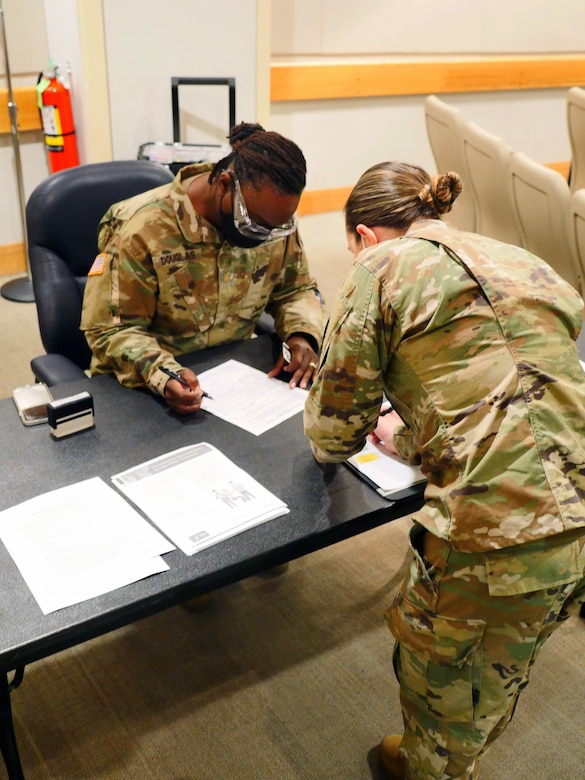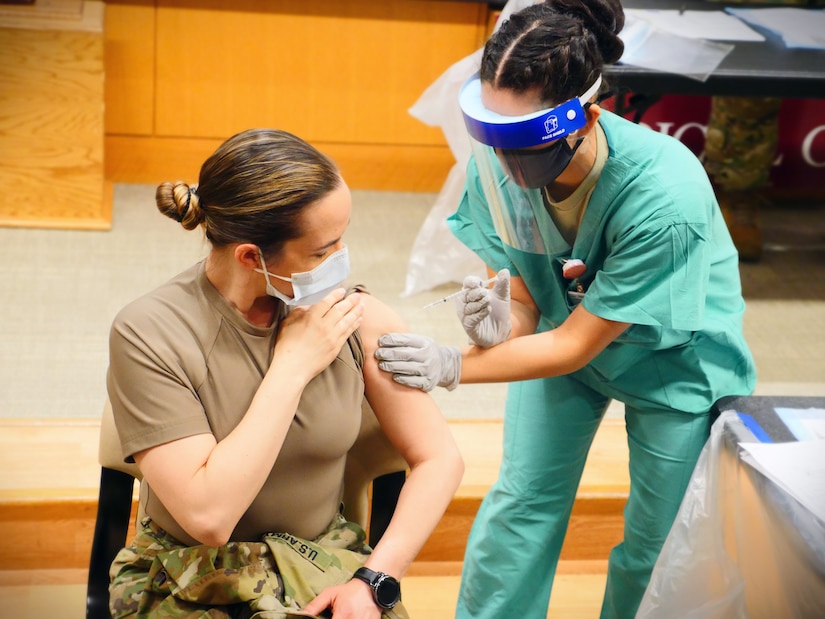Dec. 22, 2020 |
Army Capt. Rebecca Parrish, an Army nurse who has been serving on the frontlines of health care since the pandemic began, was among a small group of frontline medical professionals who received the first Pfizer-BioNTech COVID-19 vaccines at BAMC.
"I'm ready to eradicate this virus," said Parrish, a COVID-19 intensive care unit nurse.

After Air Force Senior Airman Marisol Salgado administered Parrish's shot, a round of applause broke out in the room.
"This is a historic moment for BAMC," said Army Col. Michael Wirt, deputy commanding officer. "We are excited to launch this program today, focusing on our frontline staff, and look forward to expanding it to additional BAMC clinical and support teams in the days ahead."
As for the shot itself, "The flu shot hurts way more than that did," Parrish said with a smile. "I didn't even feel the needle go in."
Air Force Col. Heather Yun, deputy commander for medical services and an infectious disease physician, said she was "grateful and quite honestly thrilled to see this moment in history arrive."
"We have a vaccine that by all the data represents an incredibly effective and safe solution that exceeds all of our initial expectations, performing well in all ages, all demographic groups tested and with 95% efficacy," Yun said. "This is the turning point that we have all been waiting for, and I am so ready to take this necessary step to putting the pandemic in the past. When it's my turn, you will find me in that line with my sleeve rolled up."
The Food and Drug Administration issued an emergency use authorization, or EUA, for the Pfizer-BioNTech COVID-19 vaccine last week for U.S. citizens ages 16 and older on a voluntary basis. The San Antonio Military Health System, to include BAMC and Wilford Hall Ambulatory Surgical Center, is among the handful of Defense Department sites to receive doses of the vaccine. As the distribution hub, WHASC began vaccinating earlier this week, while BAMC received its first allocation of the vaccines after a thorough review of the receipt, distribution and administration process.
"The fact that we are among the first DOD sites to receive the vaccine is a testament to this team and their ability to carry out this important mission," said Army Brig. Gen. Shan Bagby, BAMC commanding general. "This process took a tremendous concerted effort from our logistics, administrative and clinical personnel."
The DOD's COVID-19 Task Force selected initial distribution sites based on capabilities that included the ability to accommodate ultra-cold, bulk storage; population of priority personnel and sufficient medical personnel to administer and track vaccine recipients.
BAMC will distribute the vaccine in a phased process, based on guidance from the Defense Department and Centers for Disease Control and Prevention. The first phase includes inpatient and outpatient health care and support personnel, emergency services and public safety personnel. At BAMC, the intensive care unit and emergency department staff involved in direct patient care were the first group vaccinated..
"After we validate the vaccination flow, we will begin to vaccinate in larger numbers and expand the recipient population, based on supply and the prioritization plan," said Bagby, noting more information regarding local prioritization of staff and patients will be available soon.
"We know there will be questions regarding this program, and we will do our best to address all concerns," he added. "We want to ensure our patients, service members, staff and families fully understand the process as we distribute and administer the vaccine in the days ahead, starting with the prioritized groups."

As the program ramps up, health care leaders are encouraging people to take the vaccine when offered to protect their health as well as the health of their family and community.
Yun acknowledged the uncertainty the public may feel about COVID-19 vaccines and their safety and stressed the importance of education and information to allay concerns.
"The vaccine approval process may seem swift, but I want to assure everyone that the review process has been incredibly comprehensive with all the data made available to peer-review, to an independent working group and to the Food and Drug Administration. The process has been open to the public, transparent and reassuringly highly rigorous."
"With approximately 70,000 subjects enrolled between the Pfizer and Moderna trials, which use the same technology, the symptom profile has been similar to what is seen with other routine vaccines, and most people did not have any symptoms beyond a sore arm," she added.
Post-vaccination symptoms are normal and, in fact, a positive sign, Yun explained. "Vaccines fight disease by producing an immune response within the body. Sometimes that means flu-like symptoms, such as aches and pains, headache and a low-grade fever may occur after being vaccinated. This is normal and a sign that your body is creating an immune response to protect you from COVID-19."
"Every person who steps up to take the vaccine when it's their turn is another step toward ending the pandemic," Yun noted, stressing the importance of having a large proportion of the population who are immune to SARS-CoV-2.
"This is our pathway to ending this pandemic safely; to contemplating a future without anxiety about transmitting COVID-19 to our loved ones; to ending the otherwise endless news reports on the climbing numbers of deaths; to being able to plan dinners out, concerts, weekends and holidays, vacations and college and nursing home visits; to attend births, graduations. promotions, weddings and all the important milestones of life" she said. "This, just like wearing masks and washing hands, will be a step that we can take to protect not only ourselves but also our families, our communities and our country."
"It's incredibly exciting to be involved in this historic national effort to stop the spread of COVID-19," Bagby added. "We are truly at the tip of the spear in this fight against this virus."
Get more information on the DOD's COVID-19 efforts and distribution plan from the Military Health System.
(Elaine Sanchez is assigned to Brooke Army Medical Center.)








No comments:
Post a Comment